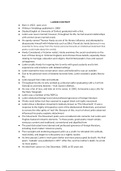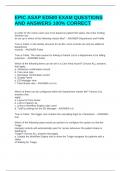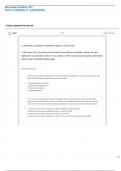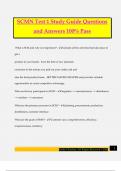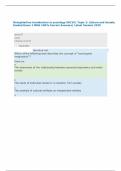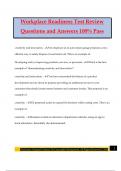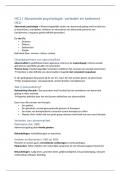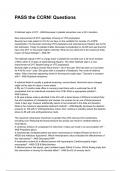Package deal
Electrolysis Bundled Exams 2025 Questions and Answers 100% Pass Guaranteed
Electrolysis Bundled Exams 2025 Questions and Answers 100% Pass Guaranteed
[Show more]Electrolysis Bundled Exams 2025 Questions and Answers 100% Pass Guaranteed
[Show more]Electrolysis GCSE Exam Questions and Answers 100% Pass Chemical changes - Began with systematic experimentation, predicting new substances and understanding living organisms' reactions. Electrolysis - Splitting a compound with electricity Electrolyte - Chemical being split (MUST be a LIQUID)...
Preview 1 out of 4 pages
Add to cartElectrolysis GCSE Exam Questions and Answers 100% Pass Chemical changes - Began with systematic experimentation, predicting new substances and understanding living organisms' reactions. Electrolysis - Splitting a compound with electricity Electrolyte - Chemical being split (MUST be a LIQUID)...
ELECTROLYSIS GCSE EXAM QUESTIONS AND ANSWERS 100% PASS Which elements are near the top of the reactivity series? - K, Na, Li Which elements are near the bottom of the reactivity series? - Au, Ag, Hg, Cu, H2 What is the acronym for oxidation and reduction? - OILRIG What is the 'OIL' in OIL...
Preview 2 out of 7 pages
Add to cartELECTROLYSIS GCSE EXAM QUESTIONS AND ANSWERS 100% PASS Which elements are near the top of the reactivity series? - K, Na, Li Which elements are near the bottom of the reactivity series? - Au, Ag, Hg, Cu, H2 What is the acronym for oxidation and reduction? - OILRIG What is the 'OIL' in OIL...
Fluid and Electrolyte Nursing 101 Exam Questions and Answers 100% Pass Solvent - a liquid such as water that can hold another substance in a solution solute - a substance that is either dissolved or suspended in a solution isotonic solution - a solution that has the same concentration of solute...
Preview 2 out of 9 pages
Add to cartFluid and Electrolyte Nursing 101 Exam Questions and Answers 100% Pass Solvent - a liquid such as water that can hold another substance in a solution solute - a substance that is either dissolved or suspended in a solution isotonic solution - a solution that has the same concentration of solute...
Electrolytes Nursing Exam Questions and Answers 100% Pass Electrolyte functions in the body - contraction of muscles sending nerve impulses creating bones balancing fluids in the body maintaining the bloods acid base balance how does the body balance electrolytes? - the kidneys filter and rea...
Preview 2 out of 8 pages
Add to cartElectrolytes Nursing Exam Questions and Answers 100% Pass Electrolyte functions in the body - contraction of muscles sending nerve impulses creating bones balancing fluids in the body maintaining the bloods acid base balance how does the body balance electrolytes? - the kidneys filter and rea...
Fluid and Electrolytes-Nursing Exam Questions and Answers 100% Pass Hypervolemia-Isotonic - Fluid Excess-equal amounts of electrolytes and water; Treatment-decrease water and electrolytes; Interventions-assess for edema and breathe sounds, monitor I&O, administer diuretics, restrict fluid intake...
Preview 2 out of 6 pages
Add to cartFluid and Electrolytes-Nursing Exam Questions and Answers 100% Pass Hypervolemia-Isotonic - Fluid Excess-equal amounts of electrolytes and water; Treatment-decrease water and electrolytes; Interventions-assess for edema and breathe sounds, monitor I&O, administer diuretics, restrict fluid intake...
Electrolytes NURSING Exam Questions and Answers 100% Pass Potassium normal range - 3.5-5.0 mEg/L Function of Potassium - Potassium controls intracellular osmolality Regulator of cellular enzyme activity Plays a role in the transmission of electrical impulses in the: nerve, heart, skeletal, int...
Preview 1 out of 4 pages
Add to cartElectrolytes NURSING Exam Questions and Answers 100% Pass Potassium normal range - 3.5-5.0 mEg/L Function of Potassium - Potassium controls intracellular osmolality Regulator of cellular enzyme activity Plays a role in the transmission of electrical impulses in the: nerve, heart, skeletal, int...
Electrolytes – Nursing Exam Questions and Answers 100% Pass Normal Sodium Levels - 135 - 145 mEg/L Function of Sodium - 1) Regulate Fluid Volume 2) Help maintain blood volume 3) Interact with calcium to maintain contraction 4) Stimulate nerve impulses Regulation of Sodium? - 1) Moves by act...
Preview 3 out of 18 pages
Add to cartElectrolytes – Nursing Exam Questions and Answers 100% Pass Normal Sodium Levels - 135 - 145 mEg/L Function of Sodium - 1) Regulate Fluid Volume 2) Help maintain blood volume 3) Interact with calcium to maintain contraction 4) Stimulate nerve impulses Regulation of Sodium? - 1) Moves by act...
Electrolysis Exam Questions and Answers 100% Pass Interpreting hair's appearance - o Follicle is every changing appendage in its growth and replacement phases o Guess depth and cellular structure of follicle - cannot see o Attain feel of the insertion 1stobjective - insertion of needle to t...
Preview 2 out of 7 pages
Add to cartElectrolysis Exam Questions and Answers 100% Pass Interpreting hair's appearance - o Follicle is every changing appendage in its growth and replacement phases o Guess depth and cellular structure of follicle - cannot see o Attain feel of the insertion 1stobjective - insertion of needle to t...
Electrolysis Exam Questions and Answers 100% Pass Electrolysis - The breakdown of a substance using electricity electrode - An unreactive rod or A metal or graphite rod by which a current enters or leaves the electrolyte. Anode - A positive electrode Cathode - A negative electrode Electrolyte...
Preview 2 out of 6 pages
Add to cartElectrolysis Exam Questions and Answers 100% Pass Electrolysis - The breakdown of a substance using electricity electrode - An unreactive rod or A metal or graphite rod by which a current enters or leaves the electrolyte. Anode - A positive electrode Cathode - A negative electrode Electrolyte...
Electrolysis Exam Questions and Answers 100% Pass adrenal glands - (Suprarrenales) sit on top of kidneys Glycogen - Sugar stored in the muscle & liver converted to glucose (source of energy) Glycogen is broken into? - Glucose Cushing syndrome - Enlarged face, muscle weakness. is caused from *t...
Preview 2 out of 6 pages
Add to cartElectrolysis Exam Questions and Answers 100% Pass adrenal glands - (Suprarrenales) sit on top of kidneys Glycogen - Sugar stored in the muscle & liver converted to glucose (source of energy) Glycogen is broken into? - Glucose Cushing syndrome - Enlarged face, muscle weakness. is caused from *t...
Electrolysis- Chemistry Exam Questions and Answers 100% Pass What will an ionic compound become when it's heated? - molten What do the ionic compounds look like in room temperature? - solid due to strong electrostatic attraction between oppositely charged ions, so the ions are unable to move ...
Preview 2 out of 5 pages
Add to cartElectrolysis- Chemistry Exam Questions and Answers 100% Pass What will an ionic compound become when it's heated? - molten What do the ionic compounds look like in room temperature? - solid due to strong electrostatic attraction between oppositely charged ions, so the ions are unable to move ...
Electrolysis (Chemistry) Exam Questions and Answers 100% pass What is electrolysis? - -The breakdown of an ionic compound using an electric current What is the electrolyte? - -Compound broken down by electrolysis How to set up an electrical circuit for electrolysis - -2 electrodes dipped into ...
Preview 2 out of 10 pages
Add to cartElectrolysis (Chemistry) Exam Questions and Answers 100% pass What is electrolysis? - -The breakdown of an ionic compound using an electric current What is the electrolyte? - -Compound broken down by electrolysis How to set up an electrical circuit for electrolysis - -2 electrodes dipped into ...
Electrolyte imbalance Exam Questions and Answers 100% Pass Hypokalemia (<3.5mEq/L) Pathophysiology - - Decrease in K+ causes decreased excitability of cells, therefore cells are less responsive to normal stimuli. Think: impaired muscle contraction. Therefore manifestations are usually muscle ...
Preview 3 out of 21 pages
Add to cartElectrolyte imbalance Exam Questions and Answers 100% Pass Hypokalemia (<3.5mEq/L) Pathophysiology - - Decrease in K+ causes decreased excitability of cells, therefore cells are less responsive to normal stimuli. Think: impaired muscle contraction. Therefore manifestations are usually muscle ...
Electrolyte Imbalances Exam Questions and Answers 100% Pass Hyperkalemia (causes) - Acute kidney failure, drugs (NSAIDS, Lisinopril (and other ACE inhibitors), ARBs, antibiotics (PCN and trimethoprim), Azole antifungals, K sparing diuretics (triamterene, amiloride, aldactone)), chronic kidney di...
Preview 2 out of 9 pages
Add to cartElectrolyte Imbalances Exam Questions and Answers 100% Pass Hyperkalemia (causes) - Acute kidney failure, drugs (NSAIDS, Lisinopril (and other ACE inhibitors), ARBs, antibiotics (PCN and trimethoprim), Azole antifungals, K sparing diuretics (triamterene, amiloride, aldactone)), chronic kidney di...
Electrolytes Imbalances Exam Questions and Answers 100% Pass The normal range for sodium - 135-145 Signs and symptoms for hypernatremia: F - Flushed skin, red and rosy Signs and symptoms for hypernatremia: R - Restless, anxious, irritable, confused Signs and symptoms for hypernatremia: I - Incr...
Preview 2 out of 5 pages
Add to cartElectrolytes Imbalances Exam Questions and Answers 100% Pass The normal range for sodium - 135-145 Signs and symptoms for hypernatremia: F - Flushed skin, red and rosy Signs and symptoms for hypernatremia: R - Restless, anxious, irritable, confused Signs and symptoms for hypernatremia: I - Incr...
Electrolyte Imbalance Exam Questions and Answers 100% Pass Sodium (Na+) - 135-145 mEq/L Potassium (K+) - 3.5-5.0 mEq/L Calcium (Ca++) - 8.6-10.2 mEq/L Phosphate (PO4[3]-) - 2.4-4.4 mEq/L Magnesium (Mg++) - 1.5-2.5 mEq/L Sodium - This is responsible for: -ECF volume/concentration -Nerve impu...
Preview 2 out of 15 pages
Add to cartElectrolyte Imbalance Exam Questions and Answers 100% Pass Sodium (Na+) - 135-145 mEq/L Potassium (K+) - 3.5-5.0 mEq/L Calcium (Ca++) - 8.6-10.2 mEq/L Phosphate (PO4[3]-) - 2.4-4.4 mEq/L Magnesium (Mg++) - 1.5-2.5 mEq/L Sodium - This is responsible for: -ECF volume/concentration -Nerve impu...
Group dynamics/cohesion Exam Questions and Answers 100% Pass What is a group - Collection of individuals who have no relations to one another that make them interdependent to some significant degree. Key requirements for a group - Interaction Mutual awareness Interdependance Continuity over t...
Preview 2 out of 7 pages
Add to cartGroup dynamics/cohesion Exam Questions and Answers 100% Pass What is a group - Collection of individuals who have no relations to one another that make them interdependent to some significant degree. Key requirements for a group - Interaction Mutual awareness Interdependance Continuity over t...
Electrolysis chemistry Exam Questions and Answers 100% Pass What are electrolytes? - Ionic compounds that are molten or dissolved in water What is electrolysis? - A process where electrical energy from a direct current breaks down electrolytes What do the free moving ions in electrolytes do dur...
Preview 1 out of 4 pages
Add to cartElectrolysis chemistry Exam Questions and Answers 100% Pass What are electrolytes? - Ionic compounds that are molten or dissolved in water What is electrolysis? - A process where electrical energy from a direct current breaks down electrolytes What do the free moving ions in electrolytes do dur...
GCSE Chemistry – Electrolysis Exam Questions and Answers 100% Pass What is electrolysis? - passing an electric current through an ionic substance that's molten or in a solution and breaks it down into new substances What is electrolysis used for? - To make new substances What is an electro...
Preview 1 out of 3 pages
Add to cartGCSE Chemistry – Electrolysis Exam Questions and Answers 100% Pass What is electrolysis? - passing an electric current through an ionic substance that's molten or in a solution and breaks it down into new substances What is electrolysis used for? - To make new substances What is an electro...

Stuvia customers have reviewed more than 700,000 summaries. This how you know that you are buying the best documents.

You can quickly pay through credit card or Stuvia-credit for the summaries. There is no membership needed.

Your fellow students write the study notes themselves, which is why the documents are always reliable and up-to-date. This ensures you quickly get to the core!
You get a PDF, available immediately after your purchase. The purchased document is accessible anytime, anywhere and indefinitely through your profile.
Our satisfaction guarantee ensures that you always find a study document that suits you well. You fill out a form, and our customer service team takes care of the rest.
Stuvia is a marketplace, so you are not buying this document from us, but from seller EmillyCharlotte. Stuvia facilitates payment to the seller.
No, you only buy these notes for $35.51. You're not tied to anything after your purchase.
4.6 stars on Google & Trustpilot (+1000 reviews)
71851 documents were sold in the last 30 days
Founded in 2010, the go-to place to buy study notes for 15 years now
